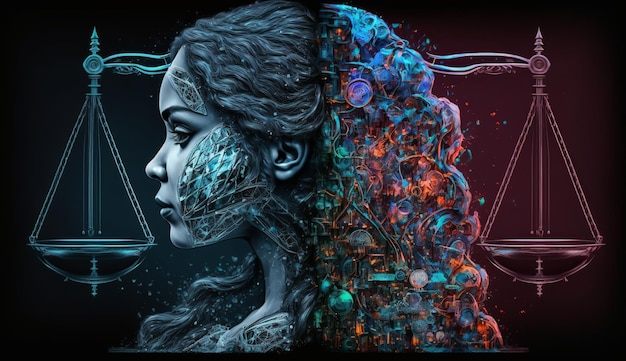AI and social justice are increasingly becoming pivotal topics as we navigate the complexities of our evolving technological landscape. Ruha Benjamin, a distinguished sociologist, challenges us to rethink the narratives presented by tech elites who often paint an altruistic vision for the future, arguing that their motives may veiled in self-interest. With the rise of AI technologies poised to impact the future of humanity, we must critically analyze their implications for marginalized communities. As Benjamin highlights, the promise of these technologies as tools for social good can be misleading, especially when they further entrench existing inequalities. Thus, the conversation surrounding AI must expand beyond mere efficiency and innovation to encompass broader ethical considerations and a commitment to justice for all.
The intersection of artificial intelligence and social equity sparks vital discussions for our society’s progress. Scholars like Ruha Benjamin urge us to critically consider the implications of emerging technologies, questioning the narratives pushed by the powerful individuals shaping our future. As we confront the challenges posed by advancing AI systems, it becomes essential to ensure they serve the collective good rather than exacerbate societal disparities. In a world increasingly dominated by algorithms and data-driven decisions, advocating for social justice within these frameworks is crucial. By fostering inclusive dialogue about the role of technology in our lives, we can envision a more equitable and just future.
Rethinking AI: Beyond Efficiency to Social Good
As AI technologies evolve, the primary narrative surrounding them often revolves around efficiency and profitability. However, Ruha Benjamin highlights the necessity of redefining this narrative to focus on social good instead. In her view, many so-called innovations in AI serve to entrench existing inequalities rather than alleviate them. For instance, facial recognition software has exacerbated issues of wrongful arrests disproportionately affecting marginalized communities. This urgency to reevaluate AI solutions calls for a more responsible and inclusive approach that prioritizes human dignity over mere computational efficiency.
Moreover, Benjamin argues that the tech elite’s portrayal of these AI technologies as altruistic innovations is misleading. By emphasizing narratives that obscure their self-interested motives, these elites risk undermining the potential for AI to actually serve the collective good. It’s crucial to foster discussions that bring together diverse perspectives, especially from those who are often left out of the conversation. By actively engaging with communities impacted by AI, a more equitable framework can be developed that ensures these technologies nurture rather than harm.
AI and Social Justice: Advocating for Equity in Technological Development
Ruha Benjamin makes a strong case for intertwining AI innovation with social justice, arguing that failing to do so could perpetuate a cycle of oppression. The historical context of eugenics serves as a warning—when technological advancements are driven by a lack of social understanding, they can replicate past injustices. This is evident in AI models that prioritize metrics over human experiences, often overlooking the complexities of the populations they affect. By advocating for an approach that integrates equity, AI has the potential to uplift marginalized voices rather than silence them.
The dialogue around AI technologies also needs to shift from a singular focus on superintelligence and futuristic fantasies to include foundational societal needs like public transportation and affordable housing. As Benjamin suggests, tackling our immediate realities should be a priority, with technological advancements being meaningful only when they serve the broader public good. Incorporating voices from the arts and humanities in these discussions is essential, as it encourages creativity and imagination in tackling social challenges and rethinking the role of technology in fostering a just society.
The Role of Universities in Shaping Future AI Narratives
Universities hold a crucial position in shaping the developmental narrative around AI, according to Ruha Benjamin. They are not only centers for technical training but also bastions for encouraging creativity and critical inquiry. By integrating the arts and humanities into STEM education, academic institutions can cultivate a multidisciplinary approach that inspires students to envision how AI can serve the community rather than merely function as an extension of existing systems of power. This emphasis on interdisciplinary education can lead to more thoughtful innovation, ultimately benefiting all societal layers.
Furthermore, Benjamin advocates for a cultural shift within academia to challenge the notion that technological proficiency equates to societal understanding. In her Tanner Lectures, she urges educators to engage students with the impacts of technologies on real lives, promoting a curriculum that combines technical skills with social awareness. As the future unfolds, fostering such intellectual environments can pave the way for innovators who not only design effective technologies but also do so with a keen sense of social responsibility and equity.
The Misconception of AI as a Neutral Decision-Maker
A critical theme in Ruha Benjamin’s discourse is the misguided perception that AI operates as a neutral arbiter in decision-making processes. This misconception, often propagated by tech elites, masks the biases embedded within algorithms, which are created by individuals influenced by their own socio-economic backgrounds. Benjamin denotes that framing AI as morally neutral ignores the consequences it bears on marginalized communities, perpetuating systems of inequality rather than dismantling them. Understanding the data-driven biases in automated systems is pivotal to ensuring that they do not reproduce historical injustices.
Beyond acknowledging these biases, Benjamin calls for a systemic overhaul of how AI technologies are developed. She suggests that technical solutions must be informed by the socio-political landscapes of the communities they are intended to serve. This entails not only including diverse voices in the design process but also continuously evaluating the social implications of these technologies. By reframing the narrative to hold AI accountable to social justice imperatives, we can ensure that technological advancements genuinely serve humanity’s future.
Imagining a Future Beyond Surveillance and Policing
In her vision for a transformed society, Ruha Benjamin challenges the current fixation on surveillance and policing as tools of progress. Instead of accepting these as inevitable features of a technological future, she encourages a radical reimagining of what a just society could look like—one that transcends oppressive structures. By inviting discussions around ethical alternatives, such as community-based safety and shared public resources, Benjamin opens the door for new forms of social organization that promote inclusion and equity. The call for imagination is vital, as it can lead to solutions that not only alleviate harm but actively work to benefit those most affected.
Benjamin posits that constructing a future anchored in concepts like empathy and collective well-being is crucial. This means encouraging societal leaders and innovators to envision frameworks beyond current realities, highlighting how investments in social services can create lasting change. AI technologies should not be solely tools of domination but instruments for liberation and empowerment. By foregrounding human dignity in technological discourse, we can inspire a movement towards a future rooted in social justice and community resilience.
Propelling Conversations on Creativity in AI Development
Ruha Benjamin stresses the importance of promoting creativity alongside technology in conversations about AI’s future. Engaging with the arts allows for innovative thinking that can interrogate the status quo and offer solutions to pressing societal issues. Instead of merely accepting existing narratives shaped by tech elites, Benjamin proposes that embracing creative dialogue can lead to transformative ideas that prioritize human experiences. By fostering environments where imagination thrives, we open avenues for unique responses to challenges posed by AI technologies.
Moreover, Benjamin believes that creativity in AI development must involve tinkering with possibilities and breaking mental barriers that limit our thinking. As societal challenges grow increasingly complex, engaging with diverse disciplines can inspire paths that lead to equitable outcomes. By integrating artistic perspectives into technological discussions, we can redefine our relationship with AI and establish values that resonate with the ethos of social good, innovation, and sustainability. This calls for a holistic approach to education and professional training in both the arts and sciences.
Building Trust in Technology: The Need for Transparency
Trust is paramount in the discourse surrounding AI technologies, yet Ruha Benjamin argues that it is often misplaced when placed solely in the hands of tech elites. Transparency in how AI systems operate and make decisions is essential for building long-term trust with the communities they impact. By presenting AI as a black box, which obscures the influences of bias and discrimination, developers and organizations risk alienating those they claim to serve. To cultivate a foundational trust, stakeholders must commit to disclosure and community engagement in technology design and implementation.
Furthermore, Benjamin highlights that creating spaces for dialogue between developers, users, and those affected by AI will enhance accountability. This means actively seeking input from diverse groups to address concerns regarding privacy, data usage, and fairness. Only by making technology development an inclusive and transparent process can we hope to bridge the gap between the tech industry and communities, and ensure that advancements genuinely contribute to societal enhancement. Emphasizing the importance of collaborative efforts will help align AI innovations with real-world needs and ethical standards.
Challenging the Status Quo: The Role of Advocacy in AI Policies
Advocacy for equitable AI policies is a vital element in reshaping the technology landscape, as highlighted by Ruha Benjamin. She calls for active engagement not just among tech insiders but across civil society to challenge policies that facilitate oppression. By mobilizing various stakeholders, including marginalized communities, advocates can demand greater accountability from tech companies and push for regulations that prioritize human rights and social justice. Such activism is crucial to countering narratives rooted in profit maximization that disregard ethical considerations.
Moreover, Benjamin emphasizes that the role of advocates extends to educating the public about the implications of AI in their lives. As people become aware of how technology can either uplift or oppress, there is potential for collective action that influences policy reform. It is essential to create a grassroots movement that emphasizes human-centric AI solutions—ones that improve access and equity rather than exacerbate social divides. By empowering individuals with knowledge and fostering advocacy, we can work towards a future where AI technologies genuinely serve the greater good.
The Future of Humanity: Envisioning Tech for Common Good
In envisioning the future of humanity, Ruha Benjamin expresses a profound need to shift the focus of technological advancements towards the common good rather than the interests of a few tech elites. This vision calls on society to critically examine the implications of current technological trajectories and encourage alternative models that prioritize collective well-being. By shifting the discourse from privilege-driven incentives to equity-based motivations, we can cultivate an environment where technology serves to uplift rather than control. Benjamin’s insistence on imagination in shaping this future is an invitation for everyone to explore innovative avenues that could lead to a more just world.
Furthermore, embracing a holistic perspective that incorporates lessons from various disciplines will be key in realizing this vision. Benjamin asserts that fostering discussions that include art, culture, and societal insights will lead to well-rounded technological narratives. These narratives should focus on enhancing human experiences and dismantling systemic barriers, rather than merely optimizing for efficiency. The future of humanity can be brighter if we collectively commit to reimagining how AI can serve our societal needs, prioritizing human values and the elevation of all individuals—especially those historically marginalized.
Frequently Asked Questions
How does AI impact social justice according to Ruha Benjamin?
Ruha Benjamin highlights that AI technologies, often branded as efficient and progressive, can perpetuate oppression rather than promote social justice. She points to issues such as facial recognition software leading to wrongful arrests, demonstrating that the algorithms can damage marginalized groups. Thus, AI’s impact on social justice is deeply tied to its implementation and the societal context in which it operates.
What are the concerns about tech elites and AI technologies in the context of social good?
Benjamin criticizes tech elites for their vision of AI-driven futures, arguing that their motives often stem from self-interest rather than genuine concern for social good. Many billionaires focus on building protective measures against potential AI apocalypses, diverting attention from societal issues like healthcare and poverty, which require immediate AI solutions designed for social justice.
Why does Ruha Benjamin argue against the belief that AI is a neutral decision-making technology?
Benjamin argues that presenting AI as a neutral decision-making technology overlooks historical injustices. She emphasizes that using algorithms, which lack emotional and social context, can reinforce the same harms inflicted by previous movements like eugenics, particularly on marginalized communities. Therefore, the perception of AI’s neutrality can mislead the discourse on its role in social justice.
How can creativity and imagination enhance the discussion of AI and social justice?
Ruha Benjamin advocates for integrating creativity and imagination into discussions about AI and social justice, suggesting that academic institutions should explore the arts and humanities alongside technology. This nuanced approach can inspire innovative solutions that address social disparities, transforming how we envision a future where AI contributes positively to humanity.
What alternatives does Ruha Benjamin propose instead of relying solely on AI technologies?
Instead of exclusively depending on AI technologies, Benjamin encourages rethinking societal needs and public goods, such as universal access to transportation and affordable housing. She questions the prioritization of high-tech solutions over addressing fundamental civic issues, urging a broader acknowledgment of diverse knowledge bases in shaping our future.
What lessons can we learn from Ruha Benjamin’s perspective on AI and social justice?
Benjamin’s insights teach us that a critical engagement with AI technologies is crucial for achieving social justice. By understanding the influences of power and privilege in tech development, and incorporating broader societal narratives into technology design, we can ensure AI serves the collective good rather than reinforcing inequality.
| Key Point | Explanation |
|---|---|
| Radical Future Vision | Ruha Benjamin argues that envisioning a radically different future should not be limited to tech elites; everyone has a role in shaping this vision. |
| Critique of Tech Elites | Billionaire CEOs often promote AI as altruistic while their actual interests are self-serving, making their possible benevolence questionable. |
| AI and Human Suffering | AI technologies frequently perpetuate oppression, as seen with false arrests due to facial recognition and biased healthcare access systems. |
| Mathematics vs. Human Factors | Using algorithms for societal decisions can harm marginalized communities, akin to historical eugenics. |
| Rethinking Innovation | There’s a need to prioritize public goods and social knowledge, rather than focusing solely on technical advancements. |
| Creativity and Imagination | A call for engagement in arts and humanities to inspire innovative solutions and break down mental barriers. |
Summary
AI and social justice are inherently linked, as highlighted by Ruha Benjamin’s discourse on the future of technology’s role in society. Emphasizing the need for creativity and a broader understanding of societal issues, Benjamin challenges the notion that only tech elites should dictate the future. By advocating for a collaborative vision that transcends mere technical advancements, she invites everyone to engage in reimagining a more equitable world. This approach not only critiques existing oppressive systems but also inspires a new paradigm where art and human values play a crucial role in shaping a just future.


